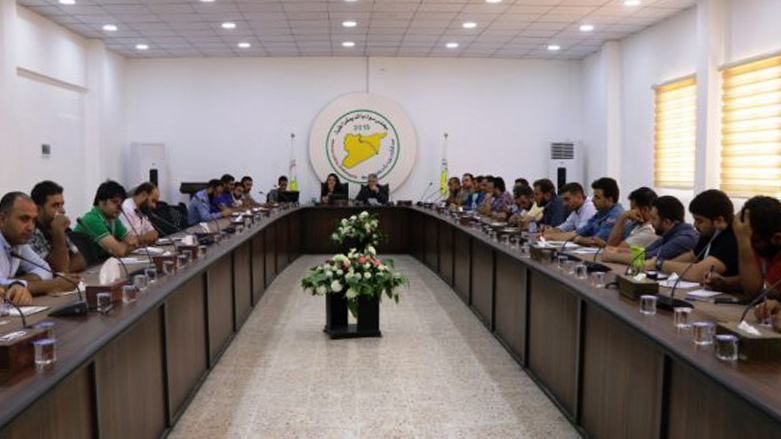SDC spokesperson says negotiations with Damascus stalled
The newly appointed spokesperson of the Syrian Democratic Council (SDC), Amjad Othman, on Monday said that negotiations between Damascus and the Kurdish-led SDC have stalled due to a “lack of will” by the Syrian government to make any concessions.

ERBIL (Kurdistan 24) – The newly appointed spokesperson of the Syrian Democratic Council (SDC), Amjad Othman, on Monday said that negotiations between Damascus and the Kurdish-led SDC have stalled due to a “lack of will” by the Syrian government to make any concessions.
“Negotiations with Damascus did not stop because of US pressure but the limited path set by the regime, which was not enough to achieve any progress,” he said in a statement.
“The US is an important partner in the fight against terrorism and its role will be significant in the future of any political solution. Going to Damascus was an independent decision, and we are still open to continue the dialogue with Damascus,” he added.
Sihanouk Dibo, the presidential advisor of the Kurdish Democratic Union Party in Syria (PYD), in an opinion piece on Sunday also confirmed that the SDC is still open to dialogue, but is not ready for “reconciliation deals,” like in Ghouta and Daraa, that led to the Syrian army taking over these areas.
Moreover, he called on Syria to focus on efforts to “liberate” Jarabulus, Afrin, al-Bab, and Idlib from the “Turkish occupation.”
The Syrian Foreign Minister, Walid al-Moallem, in an interview with Russian Today on Sunday, claimed that the US presence in northeast Syria hinders dialogue between the SDF and Damascus.
“The danger now in the eastern region stems from the American factor that is illegally present, which is providing military support for the so-called Syrian Democratic Forces in that region as the US presence hampers these forces’ dialogue with the Syrian state,” he said.
“Some of them attacked the Syrian soldiers there in an unjustified attack, and those who mounted the attack must pay the price,” al-Moallem stated.
On Sep. 8, clashes broke out between the Kurdish security forces and the Syrian regime, killing at least 11.
The clashes came a few weeks after a delegation of the US-backed, Kurdish-led Syrian Democratic Council (SDC) visited Damascus and held talks with the government.
The SDC, which is the political umbrella of the US-backed, YPG-led Syrian Democratic Forces (SDF), disapproved of the clashes.
“Any escalation, at this time, will not serve any Syrian national party that believes in dialogue to find a solution to the Syrian crisis,” the SDC said in its Sep. 9 statement.
The former head of the Democratic Union Party (PYD), Salih Muslim, in an interview on Sunday with ANF, said there have been two meetings between the SDC and the regime so far, and that there is a need to “build confidence and trust among the parties.”
However, now it seems talks have stopped.
While the Kurdish-led SDC and the US-backed SDF want a decentralized Syria and Damascus to recognize the autonomous administration in North and East of Syria, Damascus still prefers a centralized regime.
“Assad needs the Kurds to rule the north, but I doubt he is serious about any real form of autonomy that will satisfy Kurdish demands. He believes in a centralized Syria,” Joshua Landis, who heads the Middle East program at the University of Oklahoma, told Kurdistan 24.
“He may be willing to allow Kurds to keep more of the wealth of the region but real cultural or regional autonomy comparable to Iraq? I doubt it. Baathism, Arabism, and his history are all against it,” he concluded.
Editing by Nadia Riva
